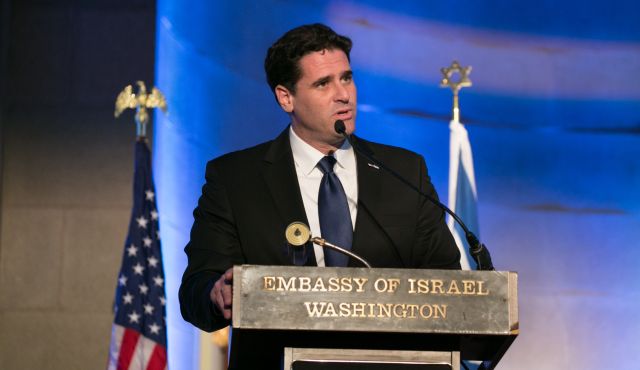[caption id="attachment_151507" align="alignright" width="218"] Israel's Ambassador to the U.S. Ron Dermer Photo by Shmuel Almany[/caption]
Israel's Ambassador to the U.S. Ron Dermer Photo by Shmuel Almany[/caption]
Jewish leaders and Democrats urged Netanyahu and Republicans to defer the speech until after the Israeli election, a senior Israeli official said, but they refused.
Prime Minister Benjamin Netanyahu’s effort to influence the nuclear negotiations with Iran by addressing Congress is worth the price Israel will pay in its relations with the U.S. administration, Ambassador to Washington Ron Dermer has told Israeli envoys working in America.
Dermer made the argument at a meeting in Jerusalem last Wednesday with the heads of Israel’s consulates in North America.
Three Israeli diplomats, some of whom were briefed subsequently on the details of the meeting, told Haaretz that Dermer tried to downplay the crisis with President Barack Obama’s administration. He admitted that Israel would pay a price for Netanyahu’s speech to Congress, they said, but denied that this would deal a mortal blow to the U.S.-Israeli relationship.
“There have been such things in the past; you shouldn’t blow this out of proportion,” one diplomat quoted Dermer as saying. “It’s possible to isolate the current dispute from the totality of our relations with the U.S.”
Dermer added that the speech to Congress represents Israel’s only chance of trying to prevent a bad agreement with Iran, because it currently has almost no ability to influence the negotiations through other channels.
He also said Israel’s main concern isn’t just the thousands of centrifuges Iran would apparently retain, but the fact that the proposed agreement will last for only 10 to 15 years, after which all restrictions on Iran’s nuclear program would be removed and it would be able to advance without hindrance.
Foreign Ministry spokesman Emmanuel Nahshon declined to comment on Dermer’s remarks, saying they were made in a closed forum.
Dermer is considered one of Netanyahu’s closest advisers, if not the closest, and his remarks to the Israeli diplomats accurately reflect Netanyahu’s view. Dermer is also the person who cooked up the speech to Congress together with Speaker of the House John Boehner.
The latter told Fox News on Sunday that he asked Dermer not to inform the White House of their efforts to arrange the speech. Dermer complied with this request, and as a result, the administration largely blames him for the move. Consequently, he has effectively become persona non grata among Obama’s staff.
A senior Israel official said that over the past two weeks, American Jewish leaders and senior officials of Obama’s Democratic Party have urged both Netanyahu and the Republican Boehner to defer the speech until after Israel’s March 17 election, so as to reduce the political tensions it has sparked. They suggested that Netanyahu instead speak right after the election, on March 18 or 19.
However, both Netanyahu and Boehner refused, the official said.
Netanyahu argued that he is coming to Washington in early March in any case for the annual AIPAC conference, so it makes no sense to come again two weeks later. He also said his chances of having an impact would be reduced after the election, because the deadline for reaching an agreement with Iran falls just one week later, on March 24.
Boehner said rescheduling is impossible because the House will be recessing in mid-March, so the later date would require recalling it for a special session.
Netanyahu continues to claim that an agreement with Iran is liable to be signed by March 24, even though Israeli intelligence agencies consider this highly unlikely. The Mossad, Military Intelligence and Foreign Ministry have all published assessments to this effect in recent weeks.
In a speech on Monday, he implicitly addressed reports that the White House, for fear of leaks, had decided to reduce information sharing with Israel about its negotiations with Iran.
“Just as Iran knows what kind of agreement is being offered, it’s only natural that Israel should know the details of the deal being formulated,” Netanyahu said. “But if there are those who think this is a good agreement, why must it be hidden?”
Also on Monday, National Security Adviser Joseph Cohen and Strategic Affairs Minister Yuval Steinitz met in Jerusalem with Philip Gordon, the White House coordinator for the Middle East, North Africa and Gulf region. In an effort to downplay the reports of reduced information sharing, Steinitz published a statement afterward saying the meeting had focused primarily on Iran’s nuclear program.
By Haaretz

 QR code
QR code